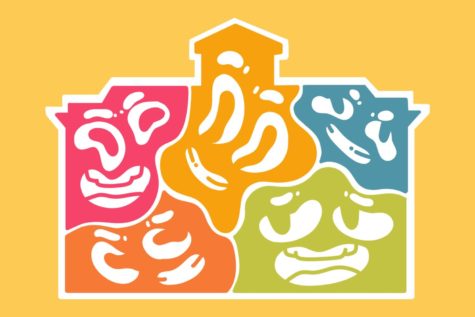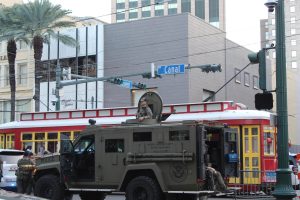Inside Louisiana’s rainbow city
October 13, 2021

People may assume it is smooth sailing for LGBTQ+ individuals in New Orleans as it is such a “liberal” city. Looking below the surface of the Crescent City, Louisiana has a long history of prejudice and injustice towards minority groups, including the gay community. Despite decades of discrimination, the New Orleans LGBTQ+ community remains a beacon of hope.
It was only in 2004 that Louisiana overwhelmingly voted to ratify a ban on same-sex marriage. Creating a safe space for the LGBTQ+ community is essential in a state where only 31% of residents approve of gay marriage — the lowest approval rate in the nation.
Throughout history, LGBTQ+ New Orleanians have lived in fear. In 1973, 32 people perished when the Upstairs Lounge, a famous gay bar, was fire bombed. To this day, those responsible have not been identified or found accountable. The LGBTQ+ community was not safe, and they needed to be protected in a climate where such hate was evident.
The later 1970s brought a new wave of activism that slowly helped stabilize and secure the New Orleans LGBTQ+ community. This union began with gay clubs, bars and Mardi Gras krewes, paving the way for groups such as Forum for Equality, PFLAG and the LGBT Community Center of New Orleans. Ultimately in 1991, New Orleans passed the Human Rights Ordinance protecting lesbian and gay people against discrimination in housing and employment in Orleans Parish.
Established in 1989, Forum for Equality helps develop and pass LGBTQ+ victories in the Louisiana legislature. The group worked with the New Orleans Police Department to create the department’s first LGBTQ+ policy. In 2015, they defeated the “Marriage and Conscience Act,” a proposed law that allowed businesses to discriminate on the basis of sexuality.
In 1992, the LGBT Community Center of New Orleans, known as the Lesbian and Gay Community Center at the time, broke ground in New Orleans. The center’s mission is to “combat homophobia, transphobia, racism and misogyny by supporting community-driven projects and organizations in the greater New Orleans area.” Despite losing their building due to Hurricane Isaac, the center rebuilt itself on South Broad Street and continues to fight for equal access and opportunities.
These communities and centers offer support and resources for anybody who may need help or information, or is seeking education. In addition to their individual missions, they support local projects and organizations with the goal of dismantling homophobia and transphobia in the New Orleans area.
For decades, gay Mardi Gras carnivals were celebrated underground. With time, similar safe spaces now openly infuse carnival celebrations with the local gay community. The Krewe of Petronius, the Krewe of Armeinus, the new Krewe of Stars and the Krewe of Mindo are among the many gay krewes promoting the celebration of LGBTQ+ life during Mardi Gras. They share a goal of illuminating Mardi Gras magic to those once excluded from the celebration.
Beyond Mardi Gras, Southern Decadence is a staple of LGBTQ+ life in the South. Hosted by the New Orleans gay community on Labor Day weekend, this six-day festival debuted in 1981. The festival grew exponentially with over 300,000 attendees flooding the French Quarter in 2018.
Despite being a jubilant source of support for the gay and lesbian community, Southern Decadence has not gone without backlash. Year after year, religious and conservative groups protest the event. In 2003, a petition to ban the event was started and in 2012, nine preachers were arrested for shouting slurs in public towards paraders.
Despite hate crimes and hurricanes, New Orleans’ flourished with LGBTQ+ pride. Yet, inclusivity in the city remains confronted with the reality of the Deep South. Although much progress has been made, safe spaces for LGBTQ+ individuals are necessary and will remain crucial in New Orleans and beyond.









Leave a Comment